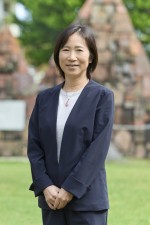
Agricultural science began as a field of study on food production and has now evolved into a field of study that considers broadly the life of people who eat food, the life of organisms that produce food, and the environment on earth, where many lives are lived. There are many challenges that need to be solved in order for living organisms, including humans, to live happily on this planet for years to come. Agricultural science is deeply involved in these challenges. To solve challenges related to food, the environment, and life, it is important to employ a wide range of approaches from natural science to social science and humanities. In order to promote such education and research in the field of agricultural science, the Graduate School of Agriculture of Meiji University has established four programs: Agricultural Chemistry, Agriculture, Agricultural Economics, and Life Sciences.
Research in the field of agricultural science ranges from basic to applied, with activities carried out in laboratories, as well as University Farms and domestic and international fields. As facilities and equipment to support these research activities, the Graduate School has advanced research devices required for research in the field of life science. We also have fields and greenhouses, as well as the Meiji University Advanced Plant Factory Research Center on Ikuta Campus, and we have the Kurokawa Field Science Center near the Campus, which we use for urban agricultural research utilizing advanced technologies. To encourage students to carry out their research to the fullest extent, we would like to further enhance our facilities and equipment.
In addition, the Graduate School aims to develop human resources who contribute to the realization of a sustainable and happy society, and consciously enhances support for post-graduate students. For graduate students, we have a teaching assistant (TA) and research assistant (RA) system to train educators and researchers, and for postdoctoral graduate students, we have an assistant program to train young researchers. Other systems that many of the students use include a reporting support system for international conferences, various scholarships, and a career support system to support career decisions. With this support, many high-level academic papers and conference presentations have been actively made in which postgraduate students are the first authors, and high level research results have been disseminated.
I hope that you will actively engage in agricultural research in the Graduate School of Agriculture and make use of the knowledge and experience you have gained in the School to spread your wings and fly.
Dean, Graduate School of Agriculture
TAKENAKA Asako


